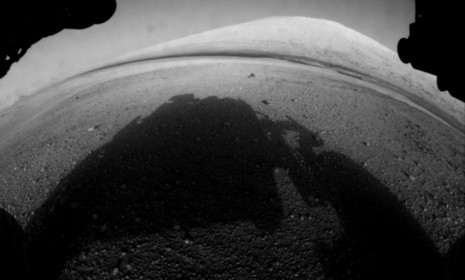4 ways of looking at the Curiosity rover's historic landing
Wheels are down! NASA's multi-billion dollar space lab will finally begin its mission to determine if life on Mars ever existed. Here's what its successful touch-down means

A free daily email with the biggest news stories of the day – and the best features from TheWeek.com
You are now subscribed
Your newsletter sign-up was successful
NASA's $2.5 billion Curiosity rover "flawlessly" touched down on Mars late Sunday — no small feat, considering that 60 percent of space missions to Mars fail when it's time to enter the Red Planet's brutal atmosphere. The high-risk landing involved a four-step process that NASA scientists affectionately branded "Seven Minutes of Terror," requiring the vessel containing the car-sized, nuclear-powered lab to slow from 13,000 mph to a full stop in a few short minutes. (Watch NASA's terrifying animation here.) Now the Curiosity, which will spend the next two years searching for evidence of life on Mars, is beaming back high-res images of the dusty planet's surface, and commentators are calling the mission a major victory for the space program. What does Curiosity's triumphant touch-down mean? Here, four interpretations:
1. It makes NASA cool again
Americans born after Apollo 11 first landed on the moon in 1960 lacked a "space moment," says Keith Wagstaff at TIME. Now they have one. At about 1:30 a.m. EST on Sunday night, Manhattan's Times Square was packed to the brim with onlookers "cheering the successful landing of Curiosity on Mars," greeting it with "the hoots and applause normally reserved for winning [football] touchdowns." And what about the hairdo that NASA's mission controller sported, asks Patrick Kingsley at The Guardian. Flight director Bobak Ferdowski unexpectedly became "the world's hippest astrophysicist" overnight thanks to his sleek punk-rock mohawk — black flecked with bits of red and blue — earning tens of thousands new Twitter followers and even inspiring a fan-driven Tumblr: "Fuck Yeah Bobak Ferdowski." Scientists are supposed to have "hair as messy as Einstein's," says Kingsley. They're not supposed to be this cool.
The Week
Escape your echo chamber. Get the facts behind the news, plus analysis from multiple perspectives.

Sign up for The Week's Free Newsletters
From our morning news briefing to a weekly Good News Newsletter, get the best of The Week delivered directly to your inbox.
From our morning news briefing to a weekly Good News Newsletter, get the best of The Week delivered directly to your inbox.
2. It's our best chance of finding life on Mars yet
If the rover detects "complex organic structures," it would be "a very strong indicator" of ancient life on Mars, says Natalie Wolchover at Life's Little Mysteries. Such a discovery would be "like finding 2-ton blocks of limestone in the desert in Egypt and saying, hmm, these might be leftover pieces of a structure around here somewhere," says Seth Shostak, a senior scientist at the SETI institute. Such evidence would certainly help us better understand our place in the cosmos. If we don't find anything, it confirms that Earth's organisms are "exceedingly rare in the universe," says NASA scientist Alexander Pavlov. But if life arose twice in the same solar system, "then that would tell us that life is extremely common."
3. It solidifies the United States' lead in the space race
Not only could Curiosity lead to human exploration of Mars by the 2030s, it demonstrates that the U.S. space program is still the gold standard. "Tonight, there are at least four countries who are on Mars, and they're on Mars because of the United States," NASA administrator Charles Bolden tells the Register. "If anybody has been harboring doubts about the status of U.S. leadership in space, well there's a one ton automobile-sized piece of America to say otherwise."
A free daily email with the biggest news stories of the day – and the best features from TheWeek.com
4. It could help reinvigorate NASA funding
President Obama called the landing "an unprecedented feat of technology that will stand as a point of national pride far into the future," says CBS News. The "budget-busting" $2.5 billion mission is NASA's "priciest gamble yet, which scientists and government officials hope will pay off with a bonanza of discoveries." It's certainly been an "uncertain time for NASA," with threats of slashed budgets and private companies like SpaceX capitalizing on NASA's diminished status, says Kevin Cirilli at Politico. President Obama proposed keeping the agency's overall budget at $17.7 billion for next year, but decreasing NASA's Mars exploration budget from $587 million to $360 million the year after. Perhaps the enthusiasm generated by Curiosity's landing could be the impetus that changes the space agency's fortunes.
Watch footage of NASA scientists celebrating here:
-
 Gisèle Pelicot’s ‘extraordinarily courageous’ memoir is a ‘compelling’ read
Gisèle Pelicot’s ‘extraordinarily courageous’ memoir is a ‘compelling’ readIn the Spotlight A Hymn to Life is a ‘riveting’ account of Pelicot’s ordeal and a ‘rousing feminist manifesto’
-
 The EU’s war on fast fashion
The EU’s war on fast fashionIn the Spotlight Bloc launches investigation into Shein over sale of weapons and ‘childlike’ sex dolls, alongside efforts to tax e-commerce giants and combat textile waste
-
 How to Get to Heaven from Belfast: a ‘highly entertaining ride’
How to Get to Heaven from Belfast: a ‘highly entertaining ride’The Week Recommends Mystery-comedy from the creator of Derry Girls should be ‘your new binge-watch’